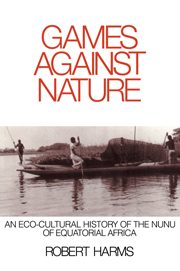Book contents
- Frontmatter
- Contents
- List of Maps
- Preface
- Preface for the paperback edition
- 1 Introduction
- 2 The Antecedents
- 3 The Tactics
- 4 The Strategies
- 5 The Drylands
- 6 The River
- 7 The Core
- 8 The Region
- 9 The Traders
- 10 The Troubles
- 11 The Opportunities
- 12 The Battle
- 13 Conclusion: Nature and Culture
- Abbreviations
- Sources Cited
- Archives
- Index
Preface for the paperback edition
Published online by Cambridge University Press: 03 November 2009
- Frontmatter
- Contents
- List of Maps
- Preface
- Preface for the paperback edition
- 1 Introduction
- 2 The Antecedents
- 3 The Tactics
- 4 The Strategies
- 5 The Drylands
- 6 The River
- 7 The Core
- 8 The Region
- 9 The Traders
- 10 The Troubles
- 11 The Opportunities
- 12 The Battle
- 13 Conclusion: Nature and Culture
- Abbreviations
- Sources Cited
- Archives
- Index
Summary
WHEN I WROTE Games Against Nature, the term “environmental history” was not yet part of my vocabulary. The environmental theme that would dominate the book emerged from two sources. The first was my experience of motoring, paddling, and poling a dugout canoe through the Equatorial African swamplands that were once inhabited by people who called themselves Nunu and being struck by the astonishing array of micro-environments packed chock-a-block into a region only 40 kilometers long by 20 kilometers wide. Often, on a voyage of ten kilometers or less, I could observe a total change in the landscape, almost as if I had left one world for another. Moving from north to south I passed from tropical rain forest to a forest-savanna mosaic, to grassland. Moving from west to east, I passed from the powerful, if lazy, waters of the Zaire River to the still waters of the swamps, and to dry land crisscrossed with creeks and bogs. To travel, in this region, was to observe a continual transformation of the landscape.
The second source was the historical accounts told by the inhabitants themselves. To my Nunu informants, historical knowledge was, above all, knowledge of the names of long-abandoned settlements now marked only by small clumps of palm trees, abandoned clearings, earthen dams, and man-made ponds. These were the landmarks by which canoes navigated.
- Type
- Chapter
- Information
- Games against NatureAn Eco-Cultural History of the Nunu of Equatorial Africa, pp. xii - xxPublisher: Cambridge University PressPrint publication year: 1988



